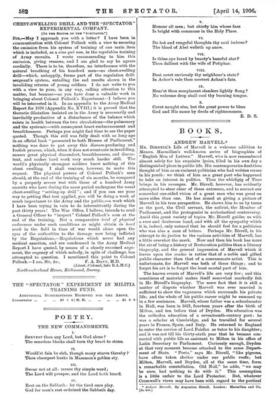CHEST-SWELLING DRML AND THE "SPECTATOR" EXPERIMENTAL COMPANY.
(TO THE BDITOR OF THE "SPECTATOR.")
SIB,—May I approach you with a letter P I have been in communication with Colonel Pollock with a view to securing the omission from his system of training of one main item which is included, as a sine qua' non, in the regulation training of Army recruits. I wrote recommending to him this omission, giving reasons, and I am glad to say he agrees cordially There is to be, therefore, no interference with the natural breathing of his hundred men—no chest-swelling drill—which, unhappily, forma part of the regulation drill- sergeant's system, entailing the sad results shown in the invaliding returns of young soldiers. I do not write to you with a view to your, in any way, calling attention to this matter, but because—as you have done a valuable work in bringing about Colonel Pollock's Experiment—I believe you will be interested in it. In an appendix to the Army Medical Report for 1876 (Appendix No. XVIII.) it is proved that the thoracic dilatation insisted on in the Army is necessarily and inevitably productive of a disturbance of the balance which exists in health between the two circulations—the pulmonary and the systemic—with consequent heart embarrassment and breathlessness. Perhaps you might find time to see the paper quoted. Though this evil was fully dealt with so long ago in an official book "presented to both Houses of Parliament," nothing was done to put away this disease-producing and foolish process, which, when it does not eventuate in invaliding, causes great physical discomfort, breathlessness, and discon- tent, and makes hard work very much harder still. The world's physically strongest soldiers know nothing of this chest swelling. I shall venture, however, to make this request. The physical powers of Colonel Pollock's men should, at the end of the training of six months, be compared by a. properly severe test with those of a hundred Army recruits who have during the same period undergone the usual chest-swelling "setting-up drill"; and if you can see your way to getting that test applied, you will be doing a work of much importance to the Army and the public,—a work which
I have been trying in vain to do intermittently during the past thirty years ! The War Office, I believe, intends to send a General Officer to "inspect" Colonel Pollock's men at the end of the training. But a comparative trial of physical endurance under such conditions as might obtain in hard work in the field in time of war would alone open the eyes of the authorities to the damage now being inflicted by the Regulations,—Regulations which never had any medical sanction, and are condemned in the Army Medical Report I have quoted, by means of a closely reasoned argu- ment, the cogency of which nobody, in spite of challenge, has attempted to question. I mentioned this point to Colonel
(Lieut.-Colonel, late R.A.M.C.)
Northumberland House, Richmond, Surrey.






































 Previous page
Previous page